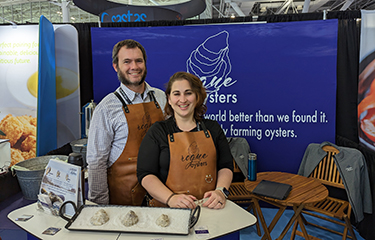Lancaster, Virginia, U.S.A.-based Rogue Oysters Co-Founder and CEO Taryn Brice Rowland said she originally began growing oysters to solve an erosion issue.
Her story starts way before the idea of founding an oyster company even arose, with Rowland’s trips to her grandmother’s cabin on the Rappahannock River in the U.S. state of Virginia. Her rule of thumb was to leave a place in better condition than you found it, Rowland said.
Fast forward several years and Rowland was doing research on how to help her grandmother solve a coastal erosion issue, and found a few solutions – one of which was restoring the local marine ecosystem.
“We discovered that the erosion was less of a concern when there were underwater grasses, and the underwater grasses disappeared when wild oysters disappeared in Virginia,” Rowland said. “So naively, my family thought they would start raising oysters to get the underwater grasses back.”
That initial thought led Rowland into the world of ocean sustainability and the environmental community, and her and her husband started learning more and more about the sustainability bona fides of oysters.
As they learned more about growing oysters, the idea of starting their own oyster farm began to gain appeal as a way move away from a corporate lifestyle into a self-made business. It's part of why they named the company Rogue Oysters, because they “went rogue," Rowland said. In the end, it was a case of a seafood company forming out of a sustainability initiatve, rather than the typical sustainability push coming from an established seafood company.
Rogue Oysters’ first oysters went in the water in 2017 – just in time for a devastating rain event that wiped out 80 percent of the company's stock. Rogue Island restarted its farming process, and Rowland said 2019 was a great growing season that led them to have plenty of product – just in time for the Covid-19 pandemic to devastate the oyster market, which centers on the foodservice sector.
“We joke that we went through two 100-year events in three years,” Rowland said.
Despite the setbacks, the company survived, and that survival has given Rowland a renewed commitment to the business.
“If we can survive Covid, our take is we can survive anything,” she said.
Rogue Island's owners have formed friendly relationships with other oyster farms in the mid-Atlantic region, an experience Rowland said was invaluable as the company has grown.
“The whole industry is better off when we treat each other as collaborators rather than competitors,” Rowland said.
Currently Rogue Oysters is planning to scale up its operations. Next year, Rowland said, the company will add another 50 percent, and keep on adding as long as there’s demand.
“As long as we keep finding a great team to support it, and make sure what we’re doing is rock solid so we don’t let our customers down, we’ll keep growing every year,” she said.
Photo by Chris Chase/SeafoodSource







